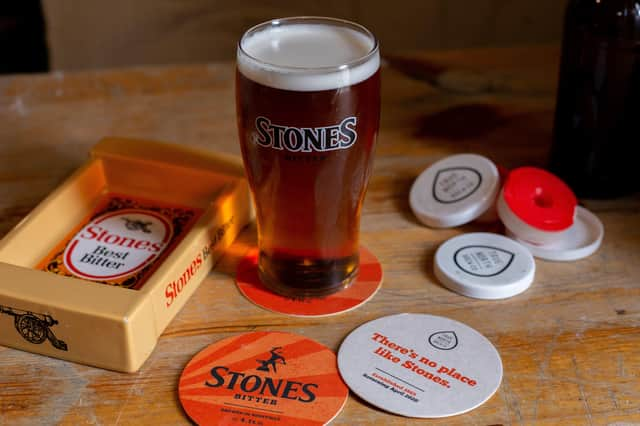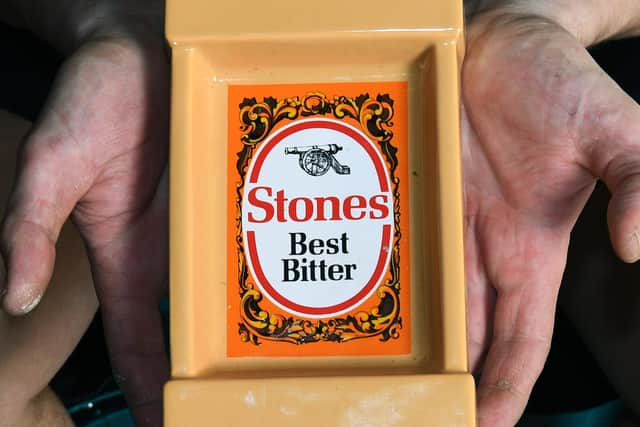Who’d want to bring back beer from the 1970s? – David Behrens


Yet in a fortnight’s time, that is what will be on the list of guest ales at several pubs in Sheffield. If it goes down well, it may turn up at your local, too.
I can’t put my finger on what it was about Stones – maybe the gaudy orange badge on the pump; perhaps just the ghastly, gassy taste of the stuff – that made it embody everything that was wrong with Britain at that time.
Advertisement
Hide AdAdvertisement
Hide AdIt wasn’t the only beer to come in a metal keg instead of a wooden cask, nor to be pumped into the glass by carbon dioxide instead of elbow grease, but as the best-selling best bitter of its time, it somehow set a low bar for everything else. We had not learned then how to be a consumer society. You drank in either a Tetley’s or a Stones pub – perhaps a Websters or Wards if you were within spitting distance of Halifax or Sheffield – and if you didn’t like it, you lumped it. If you wanted choice, you could ask for a glass with a handle.


Lunch was a slice of processed ham in a buttered barm cake, and you were kicked out at three, whether you’d finished eating it or not.
It was a time when Britain’s social life was controlled by six big breweries – the beerage, as they were known within political lobbying circles. Bass was the biggest and Stones was its principal brand of bitter. It owned the whole process, from brewery to beer mat, and laid down the law on what was sold and for how much.
Advertisement
Hide AdAdvertisement
Hide AdWe have Camra, the Campaign for Real Ale, to thank in large measure for calling time on all that. The model for a million pressure groups that followed, its lobbying led to the Beer Orders of 1989, which forced the breweries to sell off their estates and ushered in the era of guest ales – those brewed in casks by someone other than the company that owned the building.
I seldom drink beer these days and my taste buds are too worn to tell an India pale ale from my elbow, but I can appreciate what Camra did for us. I like what pubs have become, with their children’s areas, distressed decor and readiness to cook you steak and chips even when it isn’t meal time. Beer itself is a craft now, instead of just a commodity.
But of course pubs are not out of the woods. A great many remain in the hands of a few enormous estate-owning companies – the so-called pubcos that were spun off from the breweries and which have little incentive to act in the interests of the communities they serve. Although several hundred have been rescued by private entrepreneurs, they are a drop in the ocean.
Advertisement
Hide AdAdvertisement
Hide AdRishi Sunak’s Budget this week did at least throw a lifeline to the trade by abandoning a duty increase on beer, and raising the business rates discount for smaller pubs – but politicians generally have shown little will to curb the disproportionate influence the pubcos still exert on trade prices. It will be some time yet before these leviathans go the way of keg beer.
The revival of Stones, meanwhile, serves as a metaphor for the industry. Before the 1970s its best bitter did not come cold and carbonated but was drawn from the wood for the benefit of Sheffield’s steelworkers – its recipe formulated to replenish the salt they had lost from sweating in the foundries.
This was in the 1940s, before TV advertising made national brands out of what had been purely local brews. When Stones was bought out by Bass at the height of the keg revolution, it set the pattern for the plastic pint.
Advertisement
Hide AdAdvertisement
Hide AdIts rebirth brings it full circle, for it is being made in its original cask form by a small craft brewery in Sheffield, under licence from the American multinational which now owns the brand. The head brewer acknowledged that he would have his work cut out in convincing people who remembered Stones only on keg that this wasn’t going to be more of the same.
The rise of breweries like his is an inevitable and welcome consequence of the consumer society we have become. A pint of “proper” Stones may be just another drop in an ocean of alcohol, but it’s a start.
I might even try a half myself – in a glass with a handle, please, landlord.